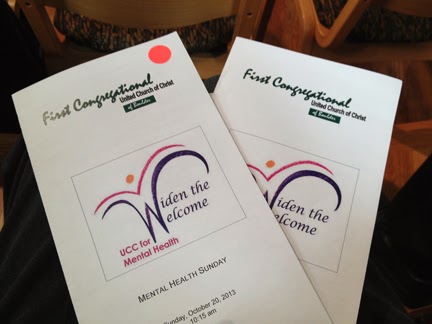by Joanne Kelly, UCC
Mental Health Network
From the North Carolina High County skirting the Great Smoky Mountains to cities nestled in the shadow of the Rockies -- and many places in
between and beyond -- people in UCC churches across the country “came out” to their congregations on Oct. 20. They weren’t talking about their sexual orientation or gender identification. They were telling their stories – some for the first time publicly -- about living with a mental illness.
At the Community UCC in Champaign, Illinois, the pastor talked about her experience with profound post-partum depression. Allie, the church’s religious education coordinator who is normally shy and soft-spoken, confidently reviewed her years-long struggle with anorexia and her subsequent involuntary admission to a locked psych unit where no pens, no drawstrings, no diet coke were allowed. “If you ever want to hit the dirt-floor bottom of your soul, try ending up somewhere where it’s considered risky to have a ballpoint pen,” she said.
“The room was absolutely at attention for the whole three
minutes she spoke,” said Ken Gilbert, a psychiatrist, member of the UCC Mental Health Network, and member of Community UCC. “There was a deep sense in the room that this is sacred time.”
Ken believes one reason Allie’s testimony was so powerful is
that Allie is clearly a daughter of the church, raised in a stable Protestant
home. “She could easily be one of our kids,” he said.

as those left sitting.
At High County UCC in Vilas, North Carolina, a congregant named “Cath” told of her journey with depression, PTSD and anxiety and her struggle with the stigma that surrounded those disorders. She told of creating a life for herself in a 400-square-foot cabin in the woods without running water. She realized her lifestyle defied societal definitions of success, but it worked to keep her grounded and mentally healthy.
“This is the first time our church used a regular worship service for this purpose, and the response from our congregation has been overwhelmingly positive,” said Cath. “People were very moved.
“As one of those who shared a personal story during the service, it was somehow both extremely uncomfortable and extremely liberating. Some confided in us afterward about more closeted struggles of their own or of
a family member, and almost all expressed thanks for our honesty.”
The services at Community UCC, High Country UCC and elsewhere were arranged in response to an invitation issued by the UCC Mental Health Network for churches to hold “Mental Health Sunday” celebrations. The organization prepared a variety of resources – including sermon starters, prayers, litanies, hymn suggestions and bulletin inserts – to make it easy for churches to participate.
“We see Mental Health Sunday as a way for congregations to begin to chip away at the stigma that surrounds mental illness,” said Rev. Alan Johnson, chair of the UCC Mental Health Network. “When we widen our welcome and support to members with mental health challenges, we follow the example of Jesus who showed us how to embrace those who are marginalized by society. And by including these members in the life and work of our churches, we are all enriched.”
The UCC Mental Health Network hopes to make Mental Health Sunday an annual event at churches everywhere on the first Sunday of May, which is Mental Health Awareness Month.